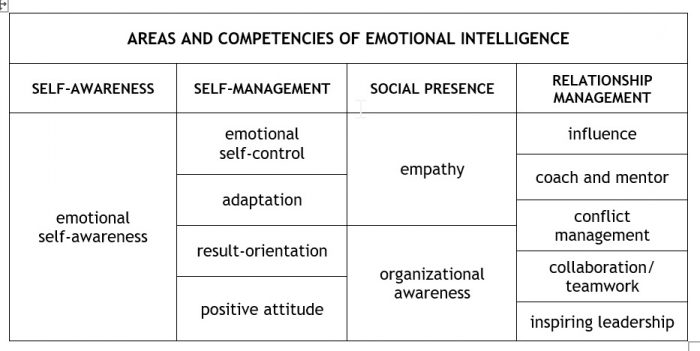Mirror, mirror…
In 2014, we had a survey where we asked young leaders, what they thought it would be worthwhile to improve to be better and more conscious leaders. We were very surprised when emotional intelligence came almost to the last place among the answers. As consultants we often believe that one important direction of leadership is the development of emotional intelligence. In those presentations where the results of research were reported and the results of EI (emotional Intelligence) were presented to the audience, similarly shared reactions were obtained. The young people in turn said:
- “Thanks, I have enough emotional intelligence”
- “I’m pretty cool anyway”
- “I understand my colleagues”
When mentors, HR managers, senior managers saw the results and asked them why this is the result of research on EI, the answers were as follows:
- I wish we understood because young leaders have room for improvement in this area.
- How can it not be important for them?
Before two groups emerge, Dear Reader, how about taking a step back and clarify what emotional intelligence is?
My client Edit, is a popular manager in her small team. She’s kind and empathetic. She understands who needs what. She experiences difficult situations as opportunities, she is always enthusiastic and at the same time, she is a source of calmness for his colleagues. She has been a leader for several years; in her previous position she did her best with her team. She said she worked with everyone almost as a partner. Her boss feels lucky with her, often praises her emotional intelligence. Edit really sees her EI as her strength and is glad she doesn’t have to develop herself as a leader in at least one area. Strangely – with all her positive attitude – she feels stuck in her career. In her current position, she already works as a director and she has had several leadership difficulties. One of her subordinate managers is slowly growing on her head. A senior colleague who’s working at the same level as her, breached her trust in many cases. In addition, he treats Edit as one of his subordinates in several cases.
The mistake that Edit and her leader fell into is a pretty common mistake: The concept of Emotional intelligence was interpreted too narrowly.
They focused on Edit’s social, sensitive, and likeable individuality, and didn’t take into account aspects of EI that could make her a stronger and more effective leader like harder feedback, shaking things up, making a difference, and the creativity needed to get out of the box. Well-distributed skill groups in all areas of EI help the leader to meet the challenges listed above.
Several models have already been set up for emotional intelligence, often referred to as EQ. Daniel Goleman Richard and E. Boyatzis in their article at the Harvard Business Review prefer the acronym EI, and define emotional intelligence itself along four abilities:
- Self-knowledge
- Self-management
- Social presence
- Relationship-management

Within the four categories, there are a total of 12 additional competencies to help the leader in reaching outstanding performance. These include the qualities that Edit is good at, but also other essential skills such as result orientation, influence, and motivational leadership. These competencies are just as related to emotions and are just as important in a leader’s development as the other mentioned previously. For example, if Edit were strong in conflict management, she would be able to give more disagreeable feedback. And if she were more inclined to influence, she would want to give harder feedback to help her immediate subordinates to develop.
For example, here is Edit’s senior manager, who is slowly growing on her head. He is arrogant and full of himself. If Edit’s EI had a wider range of competencies, instead of skipping through all the interactions, she could take out her colleague and discuss with him directly what situations his behaviour is inappropriate. Bringing unpleasant topics to the surface leads to the essence of conflict management. Edit could also influence her colleague by explaining to him, that she wants him to be successful, and by observing how his behaviour affects others, he would understand that everyone has an interest in change.
Similarly, if Edit were a more inspiring leader, she could get change through more easily.
Inspiring leaders can impart vision and mission by influencing emotions, which is a key in motivating others to turn in a new direction. She wouldn’t need confirmation from his peer, who would then breach her trust.
If a leader wants to excel, he or she needs to balance EI’s competencies.
How can you tell where you are as a leader in the development of emotional intelligence – especially if you feel strong in some areas?
Take a mirror in your hand! All right, just figuratively, but do it as honestly as possible!
How? Here are some ideas:
- If you only go through the 12 competencies in your head, you can already have a picture of what you need to improve. List typical cases along the 12 competencies for yourself and look at your own current behaviour. What do you feel lacking?
- Ask for as much feedback as possible, be thirsty for feedback!
- What Goleman and Boyatzis also recommend is 360° I use this tool countless times in coaching progresses. As it examines the perspectives of you and those who know you well, this is a particularly great help to access your EI abilities. You can find out where your strengths and weaknesses are by asking your co-workers for feedback. The more people you ask, the more accurate the picture you get. Formal, anonymous 360°assessments are not related to IQ or personality, but provide very good feedback on a leader’s effectiveness, commitment, and satisfaction.
- Professional Coaching is the biggest support when it comes to developing EI competencies. This is the opinion of Goleman and Boyatzis. Oh, and mine too! Gaining professional support in both good and bad times and while working on trying and deepening new leadership functions, is priceless.
Don’t underestimate the importance of EI, thinking that it only means “kind and good” or because you think it can’t help your development. Pick up a “mirror” and improve!
Partnering with an ICF-credentialed coach helped a lot of leaders worldwide develop EI competencies and lead with authenticity. Watch their stories and discover how coaching can help leaders and teams in your organisation reach new heights at experiencecoaching.com.
Professional coaching services can be found using ICF’s directory of credentialed coaches spread all over the world.









